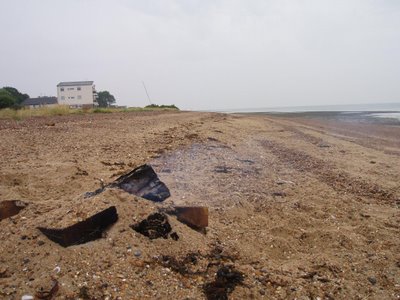
(This reminded me of a sermon that I gave for the Transfiguration in 2004 – extract below)
One of the things which I try to do in my new life here is to walk along the beach to evening prayer if I have got sufficient time – normally about once a week I manage it. I love to be exposed to the estuary, to get some sense of an environment which isn’t wholly dominated by the human scale of roads and houses. And the view is always wonderful. Sometimes it is obviously wonderful, as with a spectacular sunset, but even when the skies are grey, and its cold, and the wind is biting, it is still providing a sense of something raw and uncivilised – it helps to root me in the created order.
One evening last week I was walking along the beach and I saw a small mound of ashes up ahead. It was clearly the remnant of a fire that someone had been burning on the beach, and there was a grey pile of ash about a foot high, with what appeared to be red ribbons on it. Of course, as I got closer I realised that the red ribbons were in fact gaps in the ash covering the fire, which was still burning. It was raining, and the ash and the rain had formed a grey crust over the fire. But through the gaps you could see bright red flames flickering.
As I continued walking, I wondered whether this was an image of our faith. The core of faith is red hot; it burns; it consumes; it is something which we fear because it changes us out of all recognition, and, as with the Israelites in the desert, it can mean that our peers see us as strange. To be touched by God is, in our culture, to be seen as mentally suspect. So our culture is like the rain falling on that bonfire – it combines with the burnt off residues that the living flames of faith leave behind, and they slowly coagulate into a crust which will suffocate the fire, preventing it from breathing the air which keeps it alive – which keeps the fire burning.
And sometimes we accept that crust. For being faithful, being religious, standing up and saying ‘Yes I am a Christian’ can raise awkward personal questions. It can mean exposing some of the deepest and most personal parts of our nature, things which are tender, which are our vulnerabilities. And so we keep that fire hidden under the grey crust of social conformity. We go along with the world, we let the rain fall on our passionate hearts, and we become grey ourselves. And our life and our church seem to drift and slowly decay, and we can’t really put our finger on why. And the world thinks that church doesn’t matter, because the people who go to church are just like everyone else.
In our gospel reading we hear of Christ being transfigured on the mountainside, of being radiant with light. And this is our calling, to climb the mountain of our faith, and have that transformed and transfigured Christ living in us, so that we radiate that light and heat out into the world. As St Paul puts it we are being transformed into Christ’s likeness with ever increasing glory. For glory is what we were made from, and glory is what we were made for. Glory is that red burning flame underneath the grey crust – it struggles, but it doesn’t go out.
Our common task is to ensure that our flames of faith are fed. It is hard enough to be a Christian without giving ourselves the extra burden of trying to do it all on our own. Let us take our burning branches and bring them together, so that we can build a glorious bonfire to God, a bright sign to this community that God is in our midst, holy, and awesome, and tremendous, and frightening, and life changing, and holy, and glorious. And may we all be changed from glory to glory, in the name of the transfigured one, who will come again in glory to judge the living and the dead. Amen.
